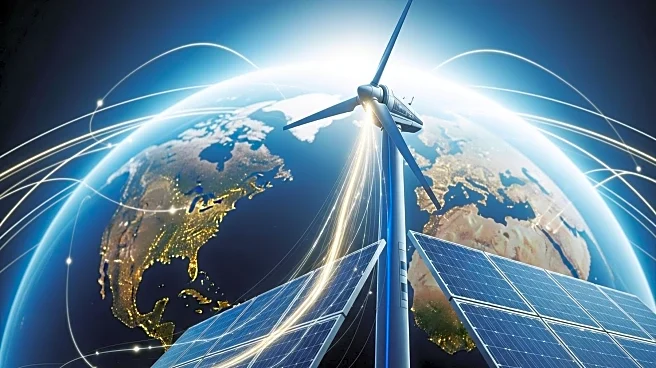What's Happening?
The International Energy Agency (IEA) has released its Renewables 2025 report, projecting a significant increase in global renewable energy capacity by 2030. The report forecasts an addition of 4,600 gigawatts (GW) to the world's installed renewable capacity, although this is slightly lower than previous estimates due to policy changes in the United States, such as the removal of federal tax credits for renewables under the Inflation Reduction Act. Despite this, the global outlook remains positive, with regions like Europe, Asia, Africa, and the Middle East showing increased growth trajectories. Solar energy is expected to lead this expansion, accounting for approximately 80% of new capacity due to decreasing technology costs and faster planning and permitting processes. The IEA highlights the concentration of solar supply chains in China, which poses challenges for nations with ambitious solar deployment plans.
Why It's Important?
The projected growth in renewable energy capacity signifies a pivotal shift in the global energy landscape, potentially reducing reliance on fossil fuels and advancing efforts to combat climate change. The expansion of renewables is crucial for meeting international climate targets and reducing greenhouse gas emissions. However, the U.S.'s reduced growth expectations due to policy changes could impact its leadership role in the global renewable energy transition. The concentration of solar supply chains in China raises concerns about supply security, emphasizing the need for diversification. The report also notes slower progress in renewable energy adoption for heat and transport, indicating areas that require further development to achieve comprehensive energy transition goals.
What's Next?
Countries are expected to continue investing in renewable energy infrastructure, with solar and pumped-storage hydropower being key areas of focus. Policymakers are advised to address supply chain concentration issues to ensure security of supply. The IEA anticipates increased electrification of transport and heating, particularly in China and Europe, alongside the adoption of biofuels in Brazil and Indonesia. These developments will be crucial for achieving broader energy transition objectives and reducing fossil fuel dependency.
Beyond the Headlines
The report underscores the ethical and strategic importance of diversifying supply chains to mitigate risks associated with geopolitical tensions and market monopolies. The transition to renewable energy also presents cultural shifts, as societies adapt to new technologies and energy sources. Long-term, the growth in renewables could lead to significant economic transformations, influencing job markets and industry standards globally.









